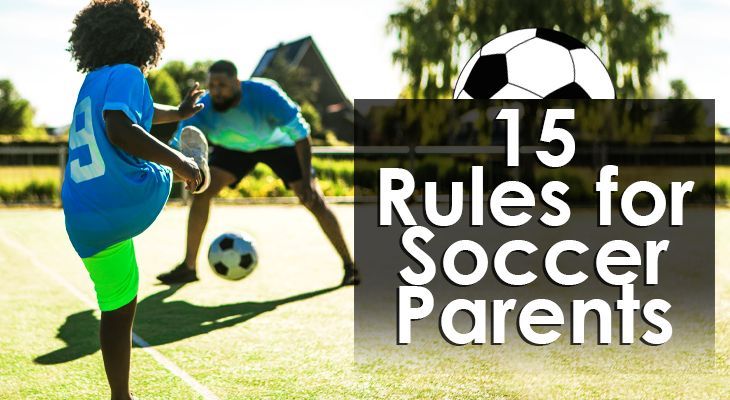15 Rules All Soccer Parents Must Follow
For millions of kids, soccer is fast becoming their favorite sport.
Participation rates are reaching record levels around the country.
As with all other sports, parents have an enormous impact on young soccer players.
While most moms and dads have good intentions, it can be a tricky field to navigate. Ensuring a fun, successful, and healthy experience depends largely on your attitude and approach.
This article breaks down 15 rules for soccer parents and will help you instill the support and confidence your child needs to thrive and succeed in the beautiful game.
Rule #1: Let the Coaches Coach
The biggest influences on your child’s soccer experience are you (the parents) and the coach.
While both have important roles to play, they are vastly different.
It’s crucial that parents gives coaches space and freedom to share their knowledge, instruct players, and build a team.
This doesn’t mean you’re powerless and uninvolved...
It simply shows that you respect their position and won’t interfere with their role.
There are plenty more ways to get involved in your child’s soccer career (see Rule #12).
If you have questions or concerns over anything the coach is doing, communicate them privately in a mature way or set up a meeting.
It’s a good idea for coaches and parents to get together at the beginning of the season to discuss their plans, coaching styles, and expectations (from players and parents).
Rule #2: Learn the Rules of the Game
Soccer is on its way to becoming the #1 sport of choice among kids in the United States.
That said, it's still very much in the development stage and lags behind American football, basketball, and baseball in popularity.
While it’s a fairly simple sport to follow, many parents don’t fully understand the rules. This can lead to frustration on the sidelines and miscommunication with the coach and your child.
Learning the rules will make the game more enjoyable for you and will allow you to follow your child's progress on the pitch.
One of the best ways to learn the rules is to follow the sport with a more knowledgeable friend. Ask them questions about specific situations when they arise.
There are also tons of free online resources to get you up to speed, including YouTube videos, websites, and forums.
If you really want to gain a deep understanding of the rules, check out the International Football Association Board (IFAB) Official Laws of the Game.
Rule #3: Respect the Referees
Let’s face it, referees don’t always get it right.
But a few incorrect whistles doesn't give you the right to disrespect or abuse them.
Most amateur referees get involved in youth soccer for their love of the game and give their time and expertise for little to no money.
Remember that you’re a role model for your child and your actions directly influence their behavior.
By treating referees with respect from the sidelines, you help create a more positive environment.
As we alluded to in Rule #2, a lack of knowledge of the rules of the game is a significant contributor to sideline disputes and referee abuse.
Do your homework, understand the game, and treat everyone with respect.
This goes for opposition coaches, players, and parents too.

Rule #4: Be Supportive, Always!
A leading causes of dropouts in youth sports is pressure, closely followed by a lack of enjoyment.
Many cases link both of these factors.
As a soccer parent, you can’t force your child to love the game.
But, you can provide them with unwavering support and create an encouraging environment that enables them to thrive.
Support comes in many forms, like direct praise on the field or more subtle support by simply being on the sidelines at their games.
Another important way to support your young star is to encourage them to focus on what's controllable. This includes their effort, attitude, and commitment.
These are important skills that can bleed into other areas of their lives.
Rule #5: Encouraging Words Go a Long Way
Soccer parents should do their best to be encouraging both on and off the field.
It’s not only important to cheer them on while they compete, but it’s also key to reinforce their achievements when you get home.
This will make the game more enjoyable for them and it helps them reach their full potential.
Off-the-field encouragement could mean discussing their highlights from practice or a game, telling them how proud you are, or simply asking them for their thoughts.
In soccer, things aren’t always rosy. Everyone has a bad game from time to time, and these are the most crucial times to be there for your child.
Rule #6: Remember to Give Space
While encouragement and support are essential, try not to be overbearing.
Remember that while you’re an indispensable part of your child’s life, playing soccer is all about fun, learning, and teamwork.
Let your child be free on the field and enjoy their time with teammates.
You don’t need to watch over every training session or comment on each individual touch.
Giving them freedom and space to make mistakes is necessary to learn and develop.
This approach should also create a more stress-free environment for the player.
Rule #7: Avoid Focusing On the Score
In all sports, it’s easy to get wrapped up in the scoreline.
But for youth players, there's a lot more to focus on than the scoreline alone.
Yes, competitiveness and achievements are both important and rewarding...
But at the developmental stage, learning, skill development, and fun should all come first.
Rather than praising your child after a win or distracting them after a loss, discuss different elements of the game.
Consider asking them what they thought went well and what didn’t.
Discuss things they’d like to work on or if they enjoyed the game.
Having this approach teaches your child about processing more than just the results.
Rule #8: Ensure Your Kid Has Fun
Soccer is the most popular sport in the world.
That said, no sport is for everyone.
Some kids need a slight push to find their way in soccer, especially younger ones.
However, there's a chance they simply won't enjoy it and would prefer another sport.
So, if your kid isn’t having fun, don’t force them to keep playing.
Who knows, maybe they’ll take it up again in a few years.

Rule #9: Practice With Your Child
Practicing in the backyard is one of the best ways to fall in love with a sport.
Joining the action shows that you care and creates a common interest between you and your child. Moreover, it’s the perfect place to refine a skill set without external pressure.
A youth coach provides kids with the knowledge and skills to excel, but they need additional practice to improve.
Research simple individual soccer drills or take note of some useful backyard exercises to make home practice even more beneficial.
But again, the focus should be on having fun so don’t take it too seriously.
Rule #10: Get the Right Gear
While soccer is one of the cheaper sports to get involved in, your child will need the basics:
- Cleats
- Shin guards
- Socks
- Shorts
- Jersey
- Ball
- Goalkeeper gloves
Other fun and practical equipment that comes in handy includes:
- Goal posts
- Net
- Cones
- Astroturf cleats
- Gear bag
Now, we understand that growing kids don’t need the most expensive equipment out there...
However, it’s important to note that quality soccer equipment can go a long way in your child’s skill development as well as health and safety.
Yes, cleats are expensive but quality cleats offer support, grip, and protection on the playing field. They can also help with ball control and movement, which are essential aspects of the game.
The same goes for shin guards.
Although professionals typically opt for smaller leg guards, they are strong, muscular, and fully-developed athletes. Children are more fragile and should focus on safety and correct fit.
While you don’t need to break the bank on gear, try to get high-quality equipment.
Rule #11: Teach Your Child Sportsmanship
Fair play and sportsmanship are some of the most admirable traits any young player can have.
A great coach can instill these values in a team, but soccer parents reinforce them.
On the soccer field, players can demonstrate sportsmanship in several ways.
Most importantly, it means being gracious in victory and defeat.
Winning and losing are part of life, and sports is the perfect teacher of this.
Teach your child that losing is part of the journey to success and equip them with the tools to learn from their defeats.
The best way to do this is to take positives from games and identify areas they can improve.
You can help form this habit by adopting the same process after a win or a loss.
Rule #12: Get Involved
There are many ways to get involved without interfering with the coach’s plans.
Simply showing up for games or taking your child to and from practice ensures you’re part of their journey.
If you want to have even more input, become a volunteer or sponsor at the club.
You can help fundraise, arrange transport, or arrange social events for players and their families.
Some parents also help with team bonding by bringing healthy snacks to eat after a game or inviting all the players for a post-match meal.
Any effort you make contributes to a better experience for your child and his or her teammates.
Rule #13: Help Create a Positive Sideline Atmosphere
Nothing spoils the fun at a youth soccer game like a toxic crowd.
Supporters often get carried away, resulting in abuse to referees, coaches, and other players.
It’s up to the parents to set the tone at these games.
Lead by example on the sideline by being positive and encouraging.
If you feel the need, set up a parents' group and have an open discussion about creating an ideal atmosphere at games.
This attitude will reflect on the field where the kids will be able to perform without external stressors.
Rule #14: Develop Relationships with Other Parents
Developing relationships with other parents is beneficial in a number of ways.
Firstly, it provides a social outlet for you, making games more enjoyable from the sidelines.
Secondly, it means you have someone to discuss any concerns or queries you might have about the schedule, training sessions, games, or tournaments.
Trust us, having another parent’s number comes in handy when you’re driving around looking for a soccer field at an away game.
Finally, having relationships with other parents ensures you have someone to rely on when you’re not around.
It’s virtually impossible to attend every single game. When you can’t be there, you’ll be glad that your child gets a ride or is being taken care of by someone you know and trust.
Rule #15: Cherish Every Moment
Having children involved in sports takes a lot of time and energy.
But these are precious times that can have an enormous impact on your child’s future.
Teammates often form bonds for life and great soccer moments are at the forefront of many childhood memories.
The more involved you are and the more you enjoy the experience, the better it will be for everyone.
Show up, take photos and videos, and cherish every moment, because it won’t last forever.

Conclusion
Being a soccer parent creates memories and experiences that you can hold dear for a long time.
Knowing how to approach your child’s sporting career goes a long way in ensuring they thrive and succeed.
Follow these 15 rules and we’re sure everything will go to plan.

